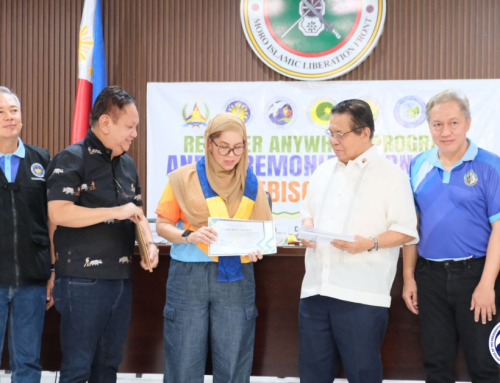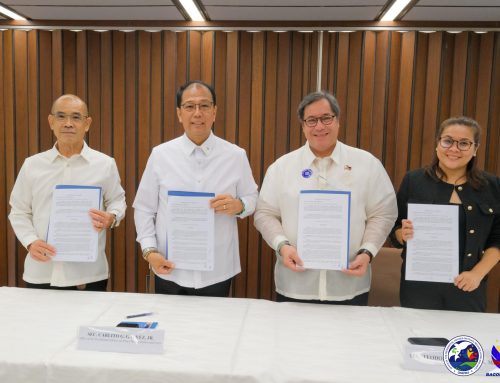House of Representatives (25 March 2021) — Presidential Peace Adviser Secretary Carlito G. Galvez Jr. lauded the House of Representatives’ Committees on Justice, and National Defense and Security for the passage of House Concurrent Resolutions granting amnesty to members of the Moro Islamic Liberation Front (MILF), Moro National Liberation Front (MNLF), Rebolusyonaryong Partido ng Manggagawa ng Pilipinas/Revolutionary Proletarian Army/Alex Boncayao Brigade (RPMP-RPA-ABB), and the Communist Terrorist Group (CTG).
The lower house’s deliberations on concurrent resolutions were in response to Presidential Proclamations 1090, 1091, 1092 and 1093, which grant amnesty to MILF MNLF, RPM-P/RPA/ABB-TPG, and CTG members who committed crimes during the course of their armed struggle.
House Resolution Nos. 12, 13, and 14, on Proclamation Nos. 1090 (MILF), 1091 (MNLF), 1092 (RRA) were approved unanimously by members of the Committee on Justice, while House Resolution No. 15 on Proclamation No. 1093 (CTG) received six affirmative and two negative votes.
On the other hand, the Committee on National Defense and Security approved House Resolutions Nos. 12, 13, and 14 on Proclamation Nos. 1090 (MILF), 1091 (MNLF), 1092 (RRA) unanimously, while House Resolution No. 15 on Proclamation No. 1093 (CTG) received 14 affirmative and one negative vote.
Signed by President Duterte on February 5 this year, the proclamations aim to restore the civil and political rights of the groups’ members that were suspended or lost by virtue of criminal conviction.
“We thank the Committee on Justice chaired by Rep. Vicente Veloso III and Committee on National Defense and Security chaired by Rep. Raul Tupas, and all the national government agencies and representatives who supported the passage of these amnesty proclamations. This development bodes well for the comprehensive Philippine peace process as a whole,” Galvez said.
“With the passage of these proclamations, we shall be able to help these former rebels reintegrate themselves into mainstream society as peaceful and productive citizens. This is a realization of the Duterte Administration’s peace and development agenda, which aims to put an end to armed conflict and bring a just and lasting peace to all Filipinos,” he added.
Galvez was among the primary resource persons during the committee deliberations.
“Hopefully those other rebel groups and combatants that were listed and officially profiled by the OPAPP and other security agencies will also benefit from this program. I hope ‘yung amnesty proclamation and the concurrent resolution in the House 12, 13, 14, 15 will be the conclusion of such an agreement,” House Minority Leader Stephen Paduano pointed out.
“Because without [these] proclamation[s], the restoration of the civil and political rights of each and every member of revolutionary combatants, walang mangyayari doon sa mga projects, walang mangyayari doon sa mga housing projects until the civil and political rights of those armed combatants will be restored through this Amnesty Proclamation,” he added.
Paduano agreed and supported the data presented by Galvez during the hearing, saying that “those groups with ongoing peace engagements [with the government] now benefited from socioeconomic packages that were signed within the provision of the peace agreement.”
Sustaining peace in the Bangsamoro
The provision of amnesty is among the major components of the normalization track of the Comprehensive Agreement on the Bangsamoro (CAB), the landmark peace agreement between the Government of the Philippines and the MILF.
The Normalization Program under the CAB seeks to achieve the meaningful transformation of combatants into peaceful and productive citizens of the society.
“We have rich experiences in the previous years and basically, the Comprehensive Agreement on the Bangsamoro (CAB), we have a very good comprehensive plan wherein we have initial subsidy for individual combatants,” Galvez explained during the hearing.
The amnesty component is also stipulated under the Final Peace Agreement (FPA) between the government and the MNLF.
The 1976 Tripoli Agreement between the Government of the Philippines (GPH) and the MNLF states that there shall be complete amnesty in the areas of autonomy and the renunciation of all legal claims resulting from the rebellion that took place in southern Philippines.
Accordingly, the FPA shall fully implement the 1976 Tripoli Agreement as it embodies and constitutes the totality of all the agreements, covenants, and understandings between the GPH and the MNLF.
With the FPA being the legal instrument implementing the 1976 Tripoli Agreement, the amnesty provision under the 1976 Tripoli Agreement has been subsumed for implementation since 1996, thereby constituting the legal basis for the grant of amnesty for MNLF members.
Second chance for former rebels
The passage of House Resolution No. 15, concurring with Presidential Proclamation No. 1093 signals the start of a new chapter for former members of the communist group who have now returned to the folds of the law.
National Defense Undersecretary Reynaldo B. Mapagu lauded the passage of this proclamation which grants amnesty to former rebels of the CTG.
According to Mapagu, this action is “a manifestation of the support” of the representatives in the Joint House Committees of Justice, and National Defense and Security “to the President’s mission to provide a better future for our former rebels.”
Mapagu hopes that “the whole House of Representatives and the Senate will eventually concur with the amnesty proclamations, which shall greatly help our former rebels as they begin their new lease in life together with their families and communities.”
With the help of the Department of Justice, Public Attorney’s Office and local E-CLIP Committees, the undersecretary hopes that the grant of amnesty under Proclamation No. 1093 will be absolve of the former rebels from the crimes they have committed “in pursuit of the flawed political objective espoused by the CPP-NPA-NDF.”
On the part of the RPM-P/RPA/ABB, particularly for the Tabara-Paduano Group (TPG), a closure agreement with the government has already been drafted. The agreement has five components which include the “Provision on the Restoration of Civil and Political Rights,” as part of the completion of the 2000 Peace Agreement.
The 2000 Peace Agreement between the government and the RPM-P/RPA/ABB was signed based on the principles of peace with honor, dignity, and justice for all, and aims to hasten the progress and development of communities that have been affected by the armed conflict.
“Ang positibong nangyari ngayon sa kamara ay nagpapatunay na kahit nasa kalagitnaan tayo ng pandemya, ang pamahalaan po ay sinsero at determinadong isulong ang komprehensibong presesong pangkapayapaan sa buong bansa,” Galvez said.###











